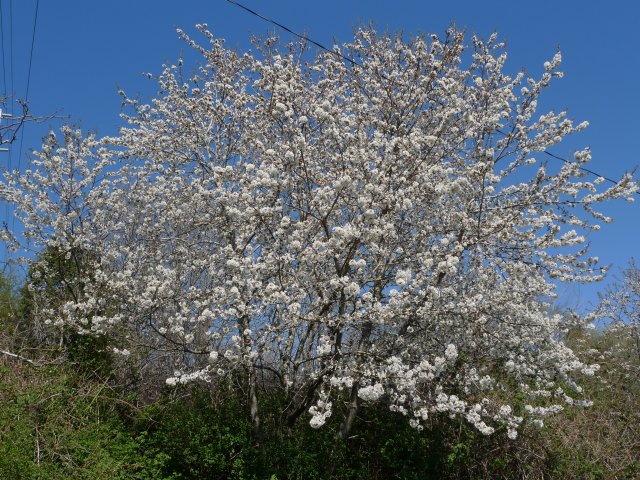Mazzard Cherry (Prunus avium)
Published at 10:41 on 20 April 2021
 I snapped the above picture just north of Squalicum Marina a few days ago; the tree is growing on a railroad embankment. This tree is native to Europe but is now widespread in the coastal Northwest. It is the parent species of most cultivated cherries, and these are in fact its origin here.
I snapped the above picture just north of Squalicum Marina a few days ago; the tree is growing on a railroad embankment. This tree is native to Europe but is now widespread in the coastal Northwest. It is the parent species of most cultivated cherries, and these are in fact its origin here.
Although it is not surprising to see an introduced species growing in an urban, disturbed environment, there is no shortage of these cherries in our native wooded areas, and its blooms are brightening the woods right now.
As with many species that have escaped from cultivation, it has for the most part reverted to wild form, with a larger overall size and thinner-fleshed fruit. It makes perfectly tasty cherries each summer (unless you are unlucky enough to find the random tree with bitter fruit) but good luck reaching most of them, as they will be for the most part high above you.
Evolution explains the smaller fruit in this and most other wild relatives of cultivated fruits. It is needlessly wasteful for a tree to expend energy creating more than the minimum food reward needed to entice animals to consume its fruit and thereby disperse its seeds; trees that expend more energy on growing taller and better competing for light in forested areas will tend to be naturally selected for. This process can be quite rapid if, as is the case here, the large-fruited characteristic is a recessive trait.
We also have a native cherry, the Bitter Cherry (Prunus emarginata). As its name implies, its fruit is unpalatable; Seattle author Arthur Lee Jacobson accurately describes it as “bitter enough to make one grimace in agony.” Its flowers are less showy than its introduced relative, and it blooms slightly later in the season.
Evolution also explains the bitterness of our native cherry’s fruit. Birds, being gifted with flight, are more mobile than the typical mammal, and thus more effective at spreading seeds far and wide. Birds also have a far different sense of taste than most mammals, and cannot perceive the presence of many substances that us mammals find unacceptably bitter. The Bitter Cherry’s fruit is thus quite literally for the birds.
